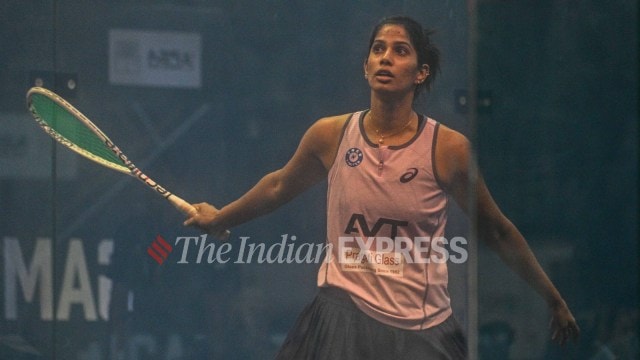Squash stalwart Joshna Chinappa on making a comeback at 38, the new crop of Indian players and the impact of sport’s inclusion in Olympics
Losing to teenage sensation Anahat Singh in Indian Open semifinals hasn't dampened Joshna Chinappa's spirit as she evolves her game to her new limitations.
 Joshna Chinappa during the Indian Open Squash tournament, at Bombay gymkhana in Mumbai on 26 March 2025. (Express Photo/Sankhadeep Banerjee)
Joshna Chinappa during the Indian Open Squash tournament, at Bombay gymkhana in Mumbai on 26 March 2025. (Express Photo/Sankhadeep Banerjee)Coming to the venue two hours before her match to work with a physio and warm up properly, and another hour with the physio after the match. At 38 and returning to competition after a knee surgery, India’s squash icon Joshna Chinappa is adjusting to a new reality.
She has had to change the way she plays as well. The younger generation is eager to make a mark. In her quarterfinal at the ongoing PSA Indian Open against India No. 2, 26-year-old Akansha Salunke, Joshna was pushed the distance before winning 3-2. It was her experience that came into play, as the veteran was content to slow the pace down.
She tried to do the same against teen prodigy Anahat Singh on Thursday, but playing an opponent 21 years her junior was too much to handle. Joshna managed to make it 1-1 but Anahat just took off thereafter, winning the match 3-1.
Comeback
Joshna underwent a knee surgery after the Asian Games in 2023 and at 38, while most professional athletes are contemplating life after retirement, she is as hungry as ever.
It’s the first time she played back-to-back PSA tournaments in India and she told The Indian Express that the intensity on tour seems to have gone up several notches. That’s largely due to squash now becoming an Olympic sport with its inclusion in the 2028 Los Angeles Games.
Joshna, though, isn’t backing down.
“I haven’t done that in years, actually,” she says of playing consecutive tournaments. “But it’s a good opportunity to be in my backyard.”
The challenge of coming back after injury, she says, was never just about physical recovery — it was also about regaining confidence, accepting and adapting to her limitations and evolving her game so that she can still play her best squash.
“It’s been almost a year now, and I’m probably better than where I was before I got injured, because I’ve done a lot of work to get fit, to strengthen my knee.”
Joshna accepts, though, that the demands of being on the professional tour in her late 30s vastly differs from the intensity with which she approached the game in her prime.
“My body just doesn’t recover as quickly as it would when I was a little younger,” she admits. “But it just helps me play smarter now.”
And it was the second game against Anahat in which she showed her “smartness”.
Knowing that she couldn’t keep up with Anahat’s pace or get sucked into long rallies, she tried to keep it flat and hard. Anahat couldn’t match up.
While she doesn’t work with a coach now, since her “experience is enough”, Joshna says she’s working more on the physical and mental aspect of the game. “I have a fitness trainer who I’ve worked with for a long time, I also do a lot of mental conditioning. I’m actually feeling good playing squash, and just want to enjoy it as much as I can.”
Changing face of squash
As she gets accustomed to playing at the elite level again, Joshna says she has been struck by the transformation of the professional squash circuit, particularly with the younger generation’s mindset.
“The floor has changed completely. Everyone’s there on a mission. Before, we’d be a little more chilled out, loud, and joked. But now everyone’s just straight in — warm up, routine, play, leave.”
A major catalyst for this shift has been squash’s inclusion in the Olympics. “At the end of the day, everybody wants a crack at the Olympics. That’s what squash has been waiting for for a long time. It’s so good to see because now the prize money has increased and there’s also a lot of attention on the sport,” she says.
Even within the Indian squash scene, Joshna sees a stark difference from when she was coming up. “When I was playing a lot more before, it was just me alone on tour, or there would be Dipika Pallikal or Saurav Ghosal. Now, there’s a whole new crop of players, and each one has a team with them.”
Tryst with coaching
Joshna had her first coaching gig last December with the Indian women’s team for the World Squash Team Championships in Hong Kong. It gave her a taste of what was to come post-retirement, but for now, she says, the court still calls.
“Coaching is hard. When I’m playing, I just worry about what I have to do. But when I was with them, I had to make sure they were okay, and watch all their matches. It’s a lot of work.”
Ironically, she now faces the players she coached. “They’re very focused. They know what they want. They’re here to win these tournaments and that’s great for Indian squash,” she says.
The Olympics are three years away, and while it would be a dream for her, she says her priorities have shifted.
“As long as my body feels good, I’ll play squash. For me, right now, my health comes first, not my squash.”
































